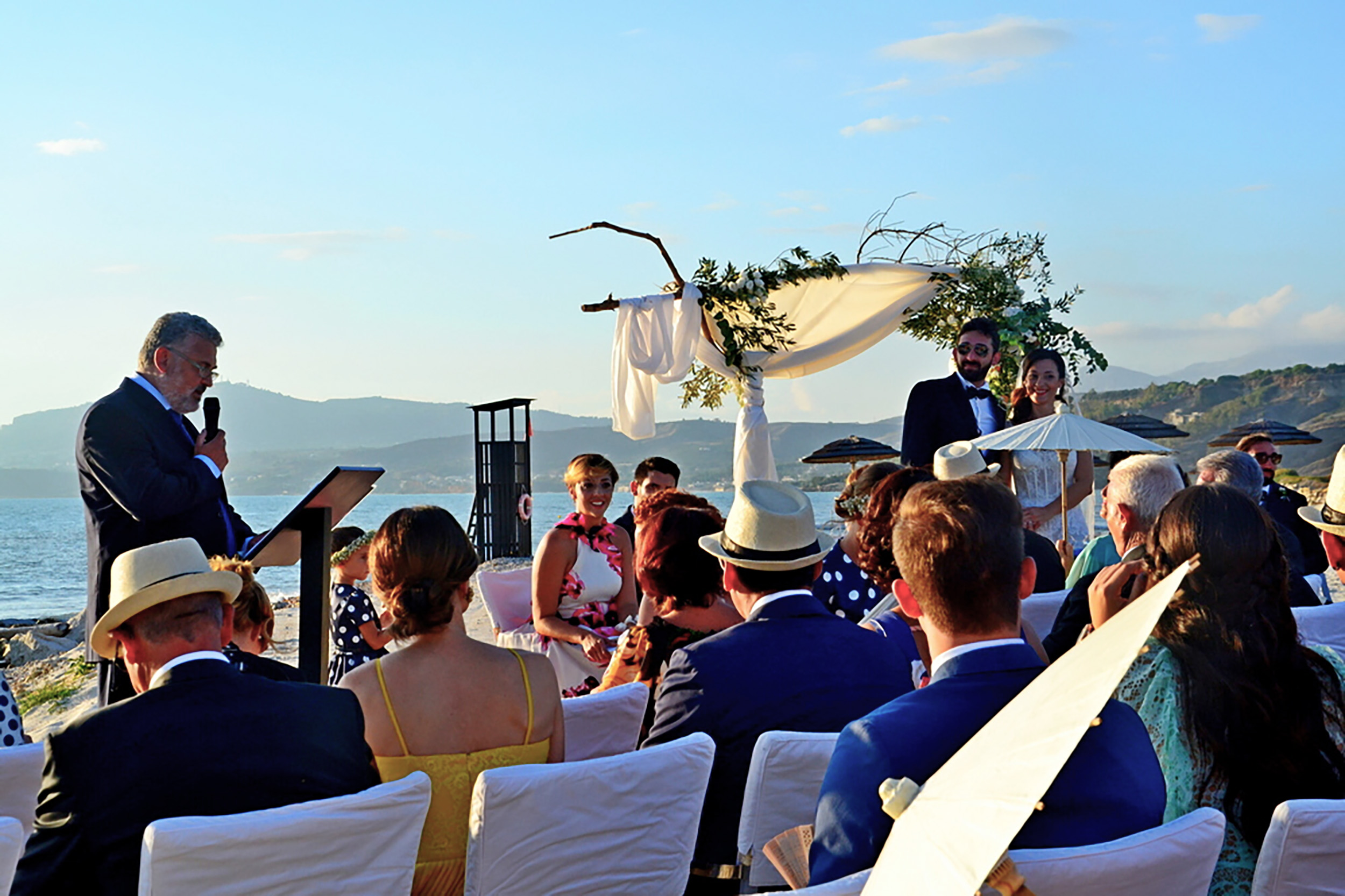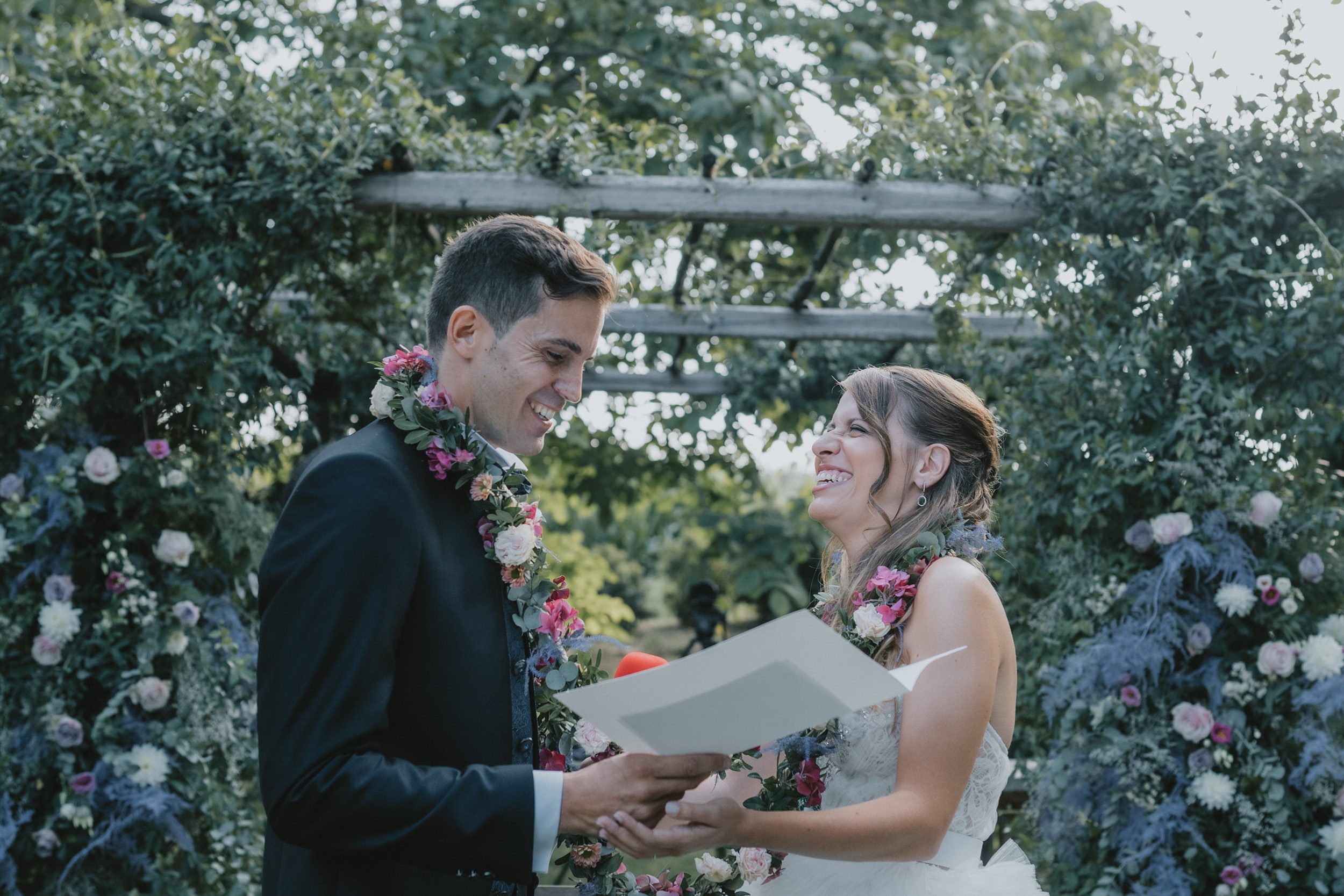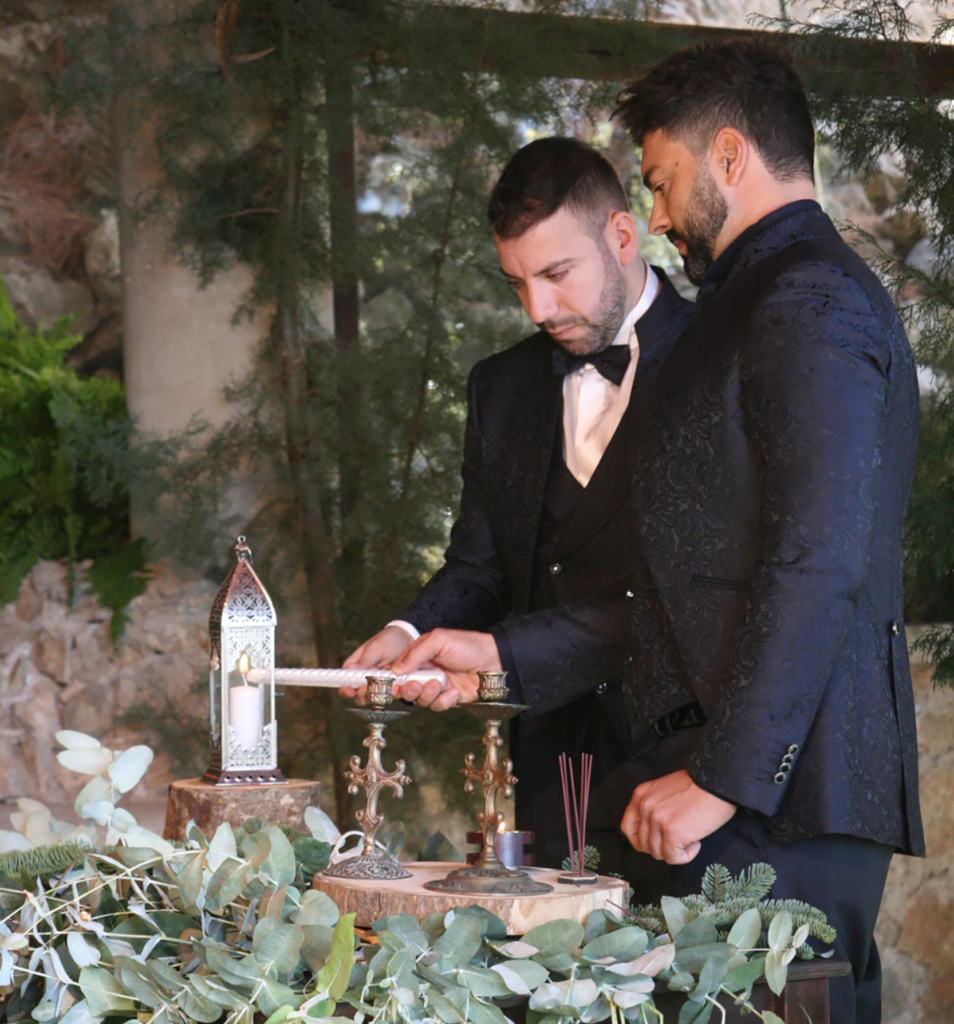faq matrimoni
WEDDINGS FAQ

photo credit Toti Domina
Why get married in Italy?
Couples from all over the world decide to come and get married in Italy because it is seen as one of the most romantic countries anywhere. Especially if you’re organising a big wedding event, planning ahead is a good idea, but nevertheless, getting married in Italy is truly worth it from every point of view: the people, the places, the food, the wine, and, last but not least … very friendly professional celebrants! Moreover, depending on which part of Italy you choose and which country you come from, it can be considerably cheaper to have your wedding in Italy than in many other countries.
How do you get married in Italy?
No matter which country you hail from, if you want to get legally married in Italy, you will need to provide the following documentation: legal proof of your identity and that of your partner. Another piece of paper you’ll need to get hold of is an affidavit from a consular office in your home country that states that there are no legal impediments to your getting married. On the Italian side, you will need what is called an atto notorio (signed by two witnesses) to prove the same thing, as well as a legal declaration of your intent to marry, which will go to the marriage office of the Italian town or city you plan to be married in. The bans (notification of your marriage) must be posted at least two weeks before your wedding date.
Religious wedding ceremonies in Italy are a little more complicated, especially Catholic weddings, because your local church needs to communicate with the church you are planning to get married in, and provide other proof of your religious affiliation.
Putting together this documentation can be daunting and if you require help, wedding planners can do this service. For more information, visit the national association of wedding planners site
The great thing about a celebrant-led wedding, on the other hand, is that none of the above is true. You can book a wonderful venue in the place of your choice, find the best possible celebrant for you, get the legal paper-work over and done with back home, and come and get married in Italy.
Who can officiate a wedding in Italy?
For a wedding in church, only a priest can officiate your marriage, but a civil or symbolic wedding can be officiated by anyone: a family member, a friend, or— even better — a professional celebrant who is trained and experienced in creating, writing, and delivering personalised wedding ceremonies that reflect your beliefs, values and personalities. A celebrant-led wedding allows you complete freedom to include traditions, cultures and rites from your different backgrounds and to celebrate your marriage wherever you are.
Is same-sex marriage legal in Italy?
Yes and No. Law No. 76 was passed in May 20, 2016 as a compromise solution and it stopped short of legalising gay “marriage”. The Civil Union, as it was called, grants the couple the same rights as opposite-sex marriage (who are not allowed to contract a Civil Union). Professional celebrants are by their very nature inclusive: they can conduct a Civil Union for you within a wedding ceremony where your love can be fully and joyfully recognised and celebrated, or, as mentioned above, you can get the legal part done at home and then come to Italy for your dream wedding!
How do you choose a wedding celebrant in Italy?
FederCelebranti is the best place to start looking for your wedding celebrant in Italy since it is the only network of professional celebrants in Italy. To become a member, celebrants must show they have the requisite training and experience. They are also subject to continuous professional development. Many of our celebrants are EU-certified with the UNI/PdR 118:2021 issued by the Italian accreditation board. Certification of this kind is a guarantee that your celebrant will have the skills and tools needed to create, craft and conduct a flawless bespoke ceremony for your wedding. Look for a celebrant that suits your style and your personality here .

photo credit Photorama
What does a wedding celebrant do?
A professional wedding celebrant will offer a no-obligation meeting with you to see whether you are a good fit before signing a contract. After that, they will meet with you as many times as required to create a bespoke script that reflects your desires and personalities, both as individuals and as a couple. They will advise you on every detail of the ceremony until it is exactly how you wanted it, making necessary changes up to the very last minute. They will liaise with the other professionals involved in your wedding (for example, your wedding planner, photographer(s), videographer(s), band or DJ), send them cue sheets with the critical parts of the ceremony highlighted for them. On the day, they will be at your venue early to make sure everything is just right, and conduct the ceremony in a professional and authentic manner.
Ten questions you should ask your celebrant before making your choice:
- What is your training?
- How do you create a bespoke ceremony?
- How often can we meet (online or in person)?
- What is your fee?
- What is included in your fee?
- What is your cancellation policy?
- Can you marry us at our venue of choice?
- Can you write and perform the ceremony in English?
- Do you ever do more than one wedding a day?
- Why do you work as a wedding celebrant?
Questions to ask yourselves after you meet your celebrant in deciding whether they are right for you:
- Did we feel that the celebrant listened to us?
- Did we feel comfortable with the celebrant (this is important since you’ll be sharing personal information and they will be with you on your most special day)?
- Does the celebrant speak English in a way that is appropriate to conducting our wedding?
- Did we feel as though the celebrant will provide us with good suggestions and work with us to help us decide what we want?
What is a symbolic ceremony?
Many people use the expression “symbolic ceremony” as a synonym for what we prefer to call a celebrant-led wedding. Essentially, the ceremony is considered “symbolic” because it does not necessarily include the legal civil marriage formula (although a legal marriage formula can be included by the celebrant in the ceremony that they are responsible for). A ceremony of this kind can be held anywhere, whereas a legal, civil marriage ceremony can only be held in an authorised town hall or a licensed venue. Moreover, a ceremony of this kind can include any elements the couple wants and is not subject to any time constraints. Couples who choose to have a symbolic ceremony consider this their wedding day, as do their guests.

photo credit Gianpiero Sfameni
Can a wedding celebrant legally marry a couple?
If you want your professional celebrant, rather than an anonymous official, to celebrate your legal wedding, you will have to obtain permission (it is called a “delega” in Italian) from the authorities for them to do so. For more information, see here
What is a civil ceremony?
If you want to be legally married in Italy, you will be looking for a civil marriage ceremony. These usually take place in a town hall or in a licensed venue with authorisation to carry out legal marriage ceremonies. These licensed venues can be indoor or outdoor locations that has been approved by the Italian authorities. There are plenty of popular wedding venues across the country that are well versed in hosting foreign weddings and will be able to provide you with all the necessary information. If you want a professional celebrant to include the legal marriage as part of a bespoke ceremony, rather than an anonymous official reading only the articles of the law, you will have to obtain permission (it is called a “delega” in Italian) from the mayor for them to do so. For more information, see here
Once your celebrant has the “delega” from the mayor authorising them to act as civil registrars for your wedding, they are required to read the law in Italian in front of two witnesses. If one or both of you do not speak Italian, you are required to have an interpreter.
The articles of law are: 143, 144 and 147 of the Civil Code for opposite-sex marriages and Articles 11 and 12 of Law No. 76 of May 20, 2016 for same-sex civil unions. You can find the text here
Can a wedding celebrant legally marry a couple?
If you want your professional celebrant, rather than an anonymous official, to celebrate your legal wedding, you will have to obtain permission (it is called a “delega” in Italian) from the authorities for them to do so. For more information, see here
What rites or symbolic gestures can I include in a celebrant wedding?
The following are just some examples of the most commonly-used symbolic rites:
- Sand ceremony, where the couple (or others, such as their children for example) pours different coloured sand into a glass vase or container either creating layers that do not mix or instead mixing them together.
- Hand-fasting (or hand-tying) ceremony, with many different versions such as the infinity knot.
- Time capsule ceremony, where significant objects alongside the couple’s vows are selected and sealed in a beautiful box to be opened on a significant anniversary of in “times of need.”
- Ring-warming or ring blessing, where the wedding rings are passed along a ribbon or in a small container from hand to hand among the guests who silently bless them and make a wish for the couple.
- Tree planting, where the couple plants a tree that will grow with their relationship.
- Wine ceremony, where the couple drinks from a “loving cup” together.
The traditional exchange of wedding rings is perhaps the most famous and best-known of all symbolic gestures. These rites will be woven into your ceremony in a way that lends the moment significance. However, they are not necessary and are always a personal choice. Your celebrant will be able to advise you what rites or gestures suit your personalities and the style that you have decided to adopt for your wedding ceremony.
What is a commitment ceremony?
A commitment ceremony is a short ceremony confirming a marriage that has already taken place elsewhere. It can be conducted by a professional celebrant, who learns a little about the couple and why they want a commitment ceremony in Italy, writes an appropriately brief, bespoke ceremony for the couple, and conducts it on the day.
What are wedding blessings?
Rather like a commitment ceremony, wedding blessings are often sought by couples who got married at home and want to create a further touching and emotional experience. Blessings can be provided in a church by a priest or in an indoor or outdoor venue by a professional celebrant who can craft a personal ceremony to mark the occasion.
What is an elopement ceremony?
An elopement ceremony is one with just the couple and a photographer, but lately the use of the term has been extended to also mean a micro-wedding, with a minimum number of guests.
The elopement can take place anywhere, anytime and has become very popular owing to its flexible “last-minute” nature, relatively low budget, and strong emphasis on visuals. A celebrant usually meets the couple online and asks questions about their wishes and desires for the ceremony: why do they want to elope? Why that particular place? What is the significance for them? They will then write a short, personalised ceremony to celebrate their love.
What is a vow-renewal ceremony?
A vow-renewal ceremony, rather like a commitment ceremony or wedding blessing, is an opportunity to choose again the person you once married and say why. For some, it is an opportunity to have a celebration with their families and friends when, perhaps, the first time around was during Covid. For others, it is a chance to have a wonderful holiday as a couple or as a family, and thank one another for the gift of their ongoing love. For others again, it may be the time to forge a new relationship after an illness or breakup. In all these situations, a professional celebrant is a useful sounding board and will advise you on how to build a beautiful, impactful ceremony.
How do you train as a professional celebrant?
In collaboration with ECCO Aps, FederCelebranti promotes training courses taught by top professionals and certified according to a national and EU-wide Reference Practice that was published in 2021 (link esterno to UNI/PdR118:2021)
To access the courses, the requirements are:
✔ a good basic education
✔ empathy and openness to others
✔ inclusiveness and respect for others
✔ knowing how to apply active listening
✔ being able to write in good Italian
✔ organisational skills and initiative
✔ willingness to challenge oneself
✔ teamwork skills and willingness to cooperate
If you are interested in learning more you can visit the association’s website
What are the best places to say “I do” in Italy?
Getting married in Florence and Tuscany
Tuscany has always been a popular region to get married for people coming from abroad. It has some of Italy’s most iconic landscapes and has many beautiful venues. Florence has become a popular place for elopements with couples often choosing a terrace or a hill with the backdrop of the city behind them.
Getting married in Umbria
Umbria is a great option as it too has beautiful scenery with olives groves on its hills and it usually costs considerably less than Tuscany. As well as many more laid-back and rustic venues, it has many castles and historic villas.
Getting married in Venice
Venice is known for its class and its magical quality. It can be wonderful to arrive at your wedding venue in a vaporetto or a gondola and to have your wedding photos with the backdrop of the beautiful buildings and canals of this unique city.
Getting married in Verona
Verona is the setting of Romeo and Juliet which, together with its charming historic centre, makes it a very romantic city. As well as in the city itself, there are also many historic villas nearby and wineries (it’s the area known for both Amarone and Soave wine). It is also only a half an hour from Lake Garda, Italy’s largest lake.
Getting married on Lake Como
Perhaps equal to Tuscany and the Amalfi Coast in popularity for luxury destination weddings is Lake Como, with its stunning lakefront villas.
Getting married in Sicily
Sicily has a wide variety of settings from stunning Baroque towns and ancient Roman villas to coastal areas, or around the famous vulcano, Etna.
Getting married in Abruzzo
Abruzzo is a region known for its mountains and national park and its traditions. As well as quite out-of-the way settings for weddings and elopements it also offers coastal venues, castles and wineries.
Getting married in the Marches
The Marches has many options for wedding venues and is a lesser-known region, which means you can get an authentic experience here. It has beaches and mountains but is best known for its rolling hills, gorgeous hamlets and wineries.
Getting married in Piedmont
Lesser known than other northern regions, Piedmont offers alpine settings, wineries (home to most famous Italian red wines of Barbero and Barberesco), castles, and the elegant capital of Turin.
Getting married in the Amalfi Coast, Capri or Sorrento
The Amalfi Coast is perhaps unrivalled for its breath-taking scenery. It offers many venues along the coast as well as in Ravello, which overlooks the coast, and on the island of Capri.
Getting married in Alberobello and Puglia
Puglia is growing in popularity for weddings and is known for its hospitality, great food, amazing traditional music to dance to (the “pizzica”) and the “masserie” (fortified farmhouses now converted into lovely hotels).
Getting married in Rome
The Eternal city offers many different venues for getting married and the most sought-after ones have historic villas and gardens with views of the city, and especially the dome of St. Peter’s. Elopements are becoming popular here. Close to the city and within easy reach of Fiumicino are countryside venues with large grounds.
Getting married in Sardinia
Couples choose Sardinia for its beautiful beaches, deep blue water, stunning mountains and wide horizons. The food and wine on the island is also exceptionally good.
